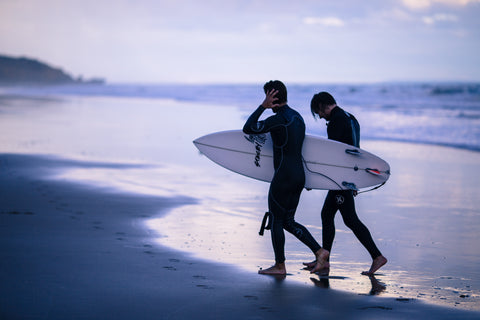What is Surfer’s Ear?
Surfer’s ear, known in the medical profession as auditory exostosis is a condition that impacts surfers across the globe. It is a gradual biological process where the bones in a person’s skull surrounding the ear canal grow boney lumps - slowly closing up the ear canal. Over time this can cause hearing loss and make it much harder for water to drain from the ears after surfing or swimming. Sea water trapped inside ear canals can cause irritation, popping and potentially impact hearing. In the worst cases, it can cause infections leading to painful earaches and other symptoms.
How It Happens
Surfer’s ear isn’t only a problem for surfers, but it is a problem that many surfers face today or will face in the future. Auditory exestosis can occur because of repeated exposure to cold water and / or wind. The body is thought to send more blood as a protective biological response to the cold impacted area, leading to more bone growth there over time. Because this process is gradual, surfer’s ear doesn’t usually become an issue for surfers until they’ve hit their 30s. Of course every case is different, depending on the frequency and intensity of exposure to cold water and or wind.
Symptoms
The most common symptoms are an increased likelihood of water being trapped in the ear canal. It might feel like water just won’t come out after a session. A related symptom might be a popping sensation or pressure inside the ears, similar to what it feels like when someone tries to equalize the pressure in their ears by yawning or chewing gum. Additionally trapped sea water loaded with bacteria could lead to ear infections that could have more dramatic impacts on one’s hearing and result in pain and discomfort. Lastly, in the most advanced stages of surfer’s ear, hearing could be impacted as the bony growths continue close off the ear to sound. While surfer’s ear comes on gradually, it can become a serious issue.
Prevention
The best way to prevent surfer’s ear is to wear ear plugs or a hood to prevent as much water and wind from impacting the ear canal as possible. Alternatively, as warmer water is thought not to be as harmful as colder water, surfers could move to warmer climates.
What To Do If You Think You Have Surfer’s Ear
Depending on the severity of the condition, living with surfer’s ear may be perfectly reasonable. As long as you are able to ensure that your ears are dried and not at risk for an infection then more serious procedures may not be necessary. Surfers Ear Drops offers drops that dry out ears and help guard against infection, and could help stave off the symptoms of surfers ear. That said, if hearing loss has already started, and water simply won’t drain no matter how many drops you apply and how much you shake your head, it may make sense to speak to a specialist ENT doctor - preferably one who practices near the coast and who has seen surfer's ear before. These specialists utilize a few different procedures that may make sense depending on the situation.
Here is an example of a specialist doctor that specializes in patients with surfer’s ear.
Surfers Ear Drops can help to clean and dry ears out to protect you from getting infections.
* We are not doctors and this post should not be construed as medical advice. For the best advice for you and your specific situation, please consult a doctor.

